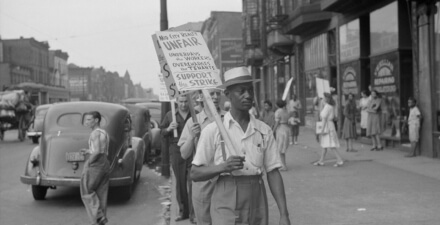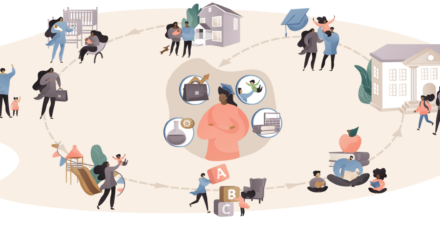Overview
Equitable Growth in Conversation is a recurring series where we talk with economists and other academics to help us better understand whether and how economic inequality affects economic growth and stability. In this installment, Kate Bahn, the director of labor market policy and chief economist at the Washington Center for Equitable Growth, speaks with Lenore Palladino, an as-sistant professor in the School of Public Policy and the Department of Economics at the University of Massachusetts Amherst and a research associate at the UMass Amherst Political Economy Re-search Institute. Her research examines corporate power and shareholder primacy in relation to the labor market, as well as the care economy. In a recent conversation, Bahn and Palladino discussed:
- The history of shareholder primacy in the United States
- Shareholder primacy and the U.S. racial wealth divide
- The difficulties of researching the U.S. gender wealth divide
- Macroeconomic modeling of U.S. household dynamics and caregiving
- The importance of Palladino’s background in law and economics to her research agenda
- Economic perspectives on the U.S. labor movement
- The heterodox approaches to economics at the New School for Social Research
Kate Bahn: Thank you so much, Lenore, for taking time in your busy schedule to join us. I’m real-ly excited to feature you in our In Conversation series because your work brings together multiple strands from economics and economic policy that Equitable Growth is interested in.
Lenore Palladino: Thanks for inviting me.
The difficulties of researching the U.S. gender wealth divide
Bahn: There also is a gender wealth gap in our nation, but it’s much more tricky to research. Can you touch on the difficulties in looking at wealth gaps by gender?
Palladino: So much of our wealth data are aggregated by households. Aggregate wealth statistics are published by the Federal Reserve via its Survey of Consumer Finances and its distributional financial accounts, which are amazing tools that make it really useful to analyze wealth by race, by education, and by income, but that’s all coded by household. Some household assets are jointly held. Homes are usually jointly held, but cars and other financial assets are actually often not jointly held, even for heterosexual married couples.
So, something that I’ve been pursuing, using IRS public-use microdata, is to break apart, even for married households, the holdings of financial assets and how they differ for men and women. I haven’t finished the work yet, but economists and other social science researchers generally know that women have traditionally held less wealth. There is a lot of great work on the gender wealth gap broadly, but I look forward to investigating how shareholder primacy is also affecting women’s wealth gaps.
My motivation and why I think it’s so important to look at shareholder primacy in terms of racial and gender inequality is because of its impact on working people and working families. Corporations that practice shareholder primacy see their employees as a cost to be minimized as much as possible. But it is hard to quantify the impact of shareholder primacy on wages, and wages for different groups of people, at an aggregate level because there’s so many factors that go into determining wages.
Or course, there are plenty of examples of specific companies where workers in sectors, such as leisure and hospitality or retail, are disproportionately people of color, disproportionately women. And there is evidence of shareholder primacy practices that enrich White wealthy shareholder households. But it’s also negatively affecting all working people and their families because of the focus of the corporation, alongside the loss of bargaining power among private sector workers across the U.S. economy.
Macroeconomic modeling of U.S. household dynamics and caregiving
Bahn: Let me switch gears a little bit to a different area of research of yours. You’ve done some macroeconomic modeling of policies that support caregiving, including home healthcare. I’m particularly interested in the larger role of combining macroeconomic modeling with household dynamics, such as caregiving. Why is that a useful endeavor?
Palladino: Well, it’s a useful endeavor because the macroeconomy is driven by household deci-sion-making: how household members participate in the workplace, what opportunities they have, and what social goods and social insurance they have access to. All these things directly frame all of their consumption choices. I teach undergrad and masters’ level economics courses, and I’m constantly mixing micro and macro intentionally with my students because they’re integrally related. They can’t be separated.
In terms of the specific research, one particular slice that I think is really important is in the area of research that you’re engaged in, Kate, around households and the workforce, and especially the care workforce. The evidence is clear that access to high-quality care benefits and child care benefits, alongside care benefits for adults receiving care in the home, all served by a decent and highly paid workforce, would benefit the workforce directly. And there also is clear documentation about how care work’s current low pay and lack of investment is the result of structural racism and patriarchal dynamics evident in our economy forever.
That’s why I find it I so incredibly frustrating that none of these care programs were included in the major policies passed earlier this year [within the Inflation Reduction Act of 2022]. I believe one reason is that there is no clear assessment that a major public investment in the care sector should be seen as part of industrial policy to grow our macroeconomy broadly. And it’s going to take a major public investment in care work to make it well-paid work and to make it work that men also will do. Care work needs to be destigmatized as a gendered field and paid better so that caregivers can sustain themselves and their families. Making those public investments is a hard sell in our society.
So, I and my [U-Mass Amherst] co-author, Chirag Lala, are researching the positive macroeconomic benefits of decently paid, defined as $15 an hour and up, care work across all 50 states. We show what the cost of that would be, in terms of public investment. And then, we detail how these now-decently paid workers would have such high marginal propensities to consume that they would be spending all that money, nearly all their new earnings, in the economy, and how that would create more jobs in sectors beyond the care economy and have positive macroeconomic effects.
Many economists and policymakers and care advocates have been talking about a crisis in care for so long that it feels like we need a new word beyond crisis. We desperately need public investment in care for all the reasons mentioned above, and it needs to be seen as a part of a new industrial pol-icy framework, which is I think a major driver of macroeconomic political economic thinking right now. And so far, I don’t see enough integration in those two areas.
Bahn: I love what you said about the way you teach your students about how microeconomic household decision-making is intimately related to macroeconomic outcomes. That’s typically been left out of economic coursework. And bringing that same micro and macro attention to care work as part of industrial strategy seems really important.
The importance of Palladino’s background in law and economics to her research agenda
Bahn: So, I also want to ask a little more about your background and how it shapes your research agenda. In addition to being trained as an economist, you’re also a lawyer. With this additional background, you’ve delved into the interdisciplinary field of law and economics. What novel or perhaps different approaches are advancing in this field, and how is that relevant to economic policymaking?
Palladino: I believe the law shapes all economic decision-making. I start out my classes by saying economics is not gravity, it’s shaped by humans, humans who participate in the political process, and our political processes are governed by law. As for law and economics as an interdisciplinary field of study, there is the Law and Political Economy Project and, just as one example of great scholarship, [Columbia Law School Edwin B. Parker Professor of Comparative Law] Katharina Pistor’s Code of Capital: How the Law Creates Wealth and Inequality. There’s so much smart, amazing work happening in this field right now. I also feel that at a more prosaic level, being trained as an attorney has been really great because I love doing the nuts and bolts economic policy work.
Looking at a statute or a piece of proposed regulatory policy and being able to respond to it or write about it by bringing the data and the analysis about what would happen is one enjoyable thing. But another, broader thing about being trained in law and economics is being able to see how it’s part of a larger program of economic governance that really has been shaped by a law and economics framework, in the neoliberal sense, and then dismantling neoliberalism to reshape economic governance. I use the language put forth by Mariana Mazzucato [a professor in the economics of innovation and public value at University College London and the founding director of the UCL Institute for Innovation and Public Purpose] a lot, the mission economy framework, the public value framework. That is a law and political economy framework, and we need to be really intentional about naming it—and that’s what we’re doing.
Bahn: And reinforcing it. There are legal frameworks that reinforce economic outcomes that then reinforce legal frameworks. So, a piece of shaping economics is to examine the legal frameworks that, in turn, shape economic policy frameworks.
Economic perspectives on the U.S. labor movement
Bahn: You also have a background doing organizing and campaign work, including within the labor movement. How has that shaped your perspective as an economist in your research agenda?
Palladino: I’m someone who never thought I would be a formal academic economist. I was an organizer in high school and in college around labor issues, which grew out of my family experience and my experience being radicalized, along with so many people, in the late 1990s, when we were going locking ourselves down outside of IMF World Bank meetings.
I went to college in Chicago, and I was fascinated by it as a city that was so racially segregated, so economically segregated, but had had this industrial past that you could still really see in the imprint of the city. Yet it was a city very much that sort of symbolized the transition that was happening from manufacturing to services in the economy. I went to the University of Chicago. I had a very direct experience, where I had tried to debate an economist and was basically told I was making moral arguments and not economic arguments, and that got my back up. So, I decided I was going to study economics. I went to the New School, where I applied to a global political economy pro-gram, even though I was working full time as a labor organizer, and eventually earned my Ph.D. in economics.
I actually feel very fortunate that I pretty much have never taken a mainstream economics class. I now teach at UMass Amherst and have taught from a heterodox perspective my whole career. So, my experience as an organizer has totally shaped what makes why I think economics is important, why I think it’s so important that people who are politically engaged to bring their best selves to rigorous economic research. And it’s also really shaped my interest in specifically researching the interplay between corporate decision-making and labor, because there’s so much important work that’s gone into labor law reform, and living wages, and minimum wages.
Basically, I just became fascinated with where the money goes. All these profits are being created, and it’s going somewhere, but that’s not just a neutral activity. There’s a reason why people are fighting so hard to get $15 an hour while corporations are pulling in billions and billions of dollars in profits. So, looking at that relationship and having the privilege to be trained to work with corporate financial data and to be able to look at what’s happening within the corporation from the other side, I hope that it can be useful to people who are organizing for labor justice.
The heterodox approaches to economics at the New School for Social Research
Bahn: You pivoted perfectly to my last question. You and I met as graduate students in the economics department of the New School for Social Research. And for those who don’t know, that program teaches from, as you described, a heterodox perspective, which is a pluralistic, outside-the-mainstream approach to economics. What insights do you think heterodox approaches have that are critical to illuminating how the economy works? Why do we need heterodox approaches in understanding how the economy works?
Palladino: When I teach my students and just talk to almost anyone who hasn’t been trained formally in sort of neoclassical or neoliberal economic thinking, it’s very obvious that we don’t live in an economy that has an infinite number of small businesses. We don’t live in an economy where we all have some sort of neutral endowments that allow us to make choices to maximize our utility.
People understand that the economy is embedded in the society, and they understand that the out-comes that we want in terms of decent lives are intimately shaped by the relationships between businesses and government and households. The economic models that we’ve been using for decades just don’t really help us understand what’s actually going on in the world. And I’ll go a step further and say, in many cases, that they’ve been used very much to justify holding the line against policies that actually would, I think, strengthen the U.S. economy overall.
So, I sometimes don’t even like to get into whether I’m a heterodox economist. I study the economy. I don’t study so much the field of economics—I study what’s actually happening in the economy, in people’s lives, and the way in which economic governance really shapes the outcomes that are possible and also shapes the way in which we see economic policymaking. And so, I think that really recognizing that there is no perfect competition, that the supply-and-demand cross that you might have been trained with just actually doesn’t describe the economy that we live in.
We need to use tools that actually help us see the world around us. That’s really the approach that I think is most helpful. You can draw many conclusions from it, and you should. But be real about what’s actually going on in the world.
Bahn: I especially like the perspective that you don’t describe yourself as a heterodox economist per se, but you do use pluralistic approaches that you learn through heterodox training. I think that’s the way I work as an economist, using a variety of tools that are helpful. Heterodox economics does tend to teach you a wider variety of tools, and different ones are helpful in different con-texts too. So, it’s not like there’s one true economics.
Palladino: Exactly.
Bahn: Thank you so much for your time today. It was really a pleasure to talk to you about your work and hear more about who you are and how it informs how you do your work.
Palladino: I’m Equitable Growth’s number one fan, so I’m very happy that you asked me to join you.
Related
The child care economy
Explore the Equitable Growth network of experts around the country and get answers to today's most pressing questions!






